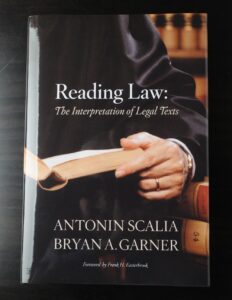Reading Law: The Interpretation of Legal Texts

Do legal documents change their meaning over time?
Are judges empowered to update them as they see fit? Is our written Constitution the only Constitution we have, or is there another one that exists outside the text? Does the judicial power include the power to legislate? May judges overturn duly enacted statutes that they think embody unwise policies? Do legal instruments have a “spirit” that can override what the words say? If an old statute is still on the books but hasn’t been enforced for decades, must judges treat it as valid law?
Does a legislature that enacts a law really have a collective “intent”? What does the law consist of, anyway? An unenacted intent or an enacted text? To what extent should judges depart from the letter of the law? Should they ignore the text when necessary to achieve favorable consequences for certain targeted groups of people, such as minorities, women, factory workers, the poor, homeowners, businesspeople, tenants, landlords, taxpayers, government workers, Indian tribes, children? Should elected legislators or unelected judges set policy? Does it make a difference if judges are elected? What does it mean to interpret a law? Are all laws interpreted, or only ambiguous ones? In law, do words really have any meaning?
In this authoritative new book, Scalia and Garner demonstrate how, especially in the latter half of the 20th century, interpretative theorists encouraged judges to disregard governing texts and to do whatever they pleased in deciding cases. The authors make a compelling case that (1) anything‑goes judicial lawmaking has never been more than a spasmodic judicial experiment, and (2) it is crucial to democracy and to the separation‑of‑powers principle to return to a more scrupulous and attentive approach to the words of legal texts.
Scalia and Garner carefully and engagingly explain 57 valid canons of construction and dispel 13 false notions about legal interpretation, using hundreds of reported cases to illuminate their discussions. They have written with their characteristic lucidity and verve to produce a rare treatise—a highly readable one that will help anyone involved in a dispute over words, words, words.
This is the authors’ second collaborative work. The first was Making Your Case: The Art of Persuading Judges (2008).
LawProse Policy on In-House CLE Credit
Under state-bar rules, the hosting group is the proper applicant for CLE accreditation. We will supply you with the necessary attachments CLE applications require.